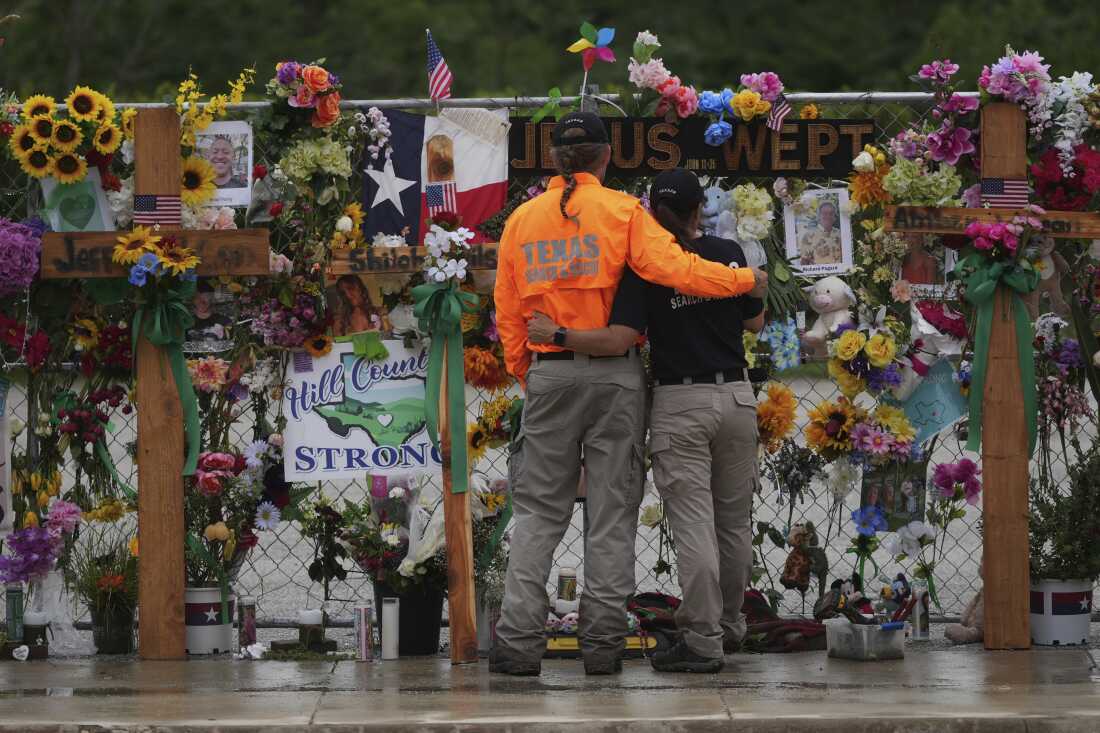In the spotlight after floods, Texas lawmakers eye disaster plans amid FEMA uncertainty : NPR


President Donald Trump speaks as first lady Melania Trump, left, and Texas Gov. Greg Abbott listen during a roundtable discussion with first responders and local officials at Hill Country Youth Event Center in Kerrville, Texas, during a tour to observe flood damage July 11.
Jacquelyn Martin/AP
hide caption
toggle caption
Jacquelyn Martin/AP
Just over two weeks since floods in the Texas Hill Country killed more than 130 people, Texas lawmakers start a special legislative session today with the aim of funding recovery and protecting from future disasters.
This spring they failed to pass a bill that could have led to increased spending for emergency warning systems. Now special committees of the House and Senate plan to go to Kerrville, the area with the most flood fatalities, to hear about the life-saving help local governments need.
They’ll be working while there’s uncertainty at the national level about the Federal Emergency Management Agency (FEMA), an agency in doubt after calls from members of the Trump administration that it be cut back or eliminated.
There were already plans for a special session this month on the totally different topic of laws to regulate sales of hemp products. But Republican Gov. Greg Abbott, in his proclamation calling the session, led with flood-related matters.
And disaster relief wasn’t all he added to the session, which can last up to 30 days. He’s also including a list of controversial GOP priorities. They include redrawing congressional voting districts in ways that would impact the 2026 midterm elections and tightening laws against medication abortion. Here are some of the issues at stake.
Flood proposals range from new alerts to rebuilding
Abbott is asking that lawmakers improve early warning systems, strengthen communications infrastructure and provide relief money for areas impacted by the recent flood or future floods.
One of the first ideas for what exactly lawmakers should do came from Republican Lt. Gov. Dan Patrick, the leader of the Texas Senate, when he spoke to Fox News after the storm.
“Had we had sirens along this area up and down, the same type of sirens that they have in Israel when there’s an attack coming that would have blown very loudly, it’s possible that that would’ve saved some of these lives.” Patrick said.
He wants those in place by next summer, when youth camps like the ones destroyed in the flooding will be operating again.
Bills already filed include proposals to tighten flood safety standards at youth camps and to create a flood disaster guide for volunteer organizations.
To hear from flood victims themselves, lawmakers are traveling to Kerrville, Texas, along the devastated banks of the Guadalupe River, for a public hearing July 31.
Texas leaders have Trump’s backing but FEMA’s future is unclear

Members of a search and rescue team visit a memorial wall for flood victims in Kerrville, Texas.
Eric Gay/AP
hide caption
toggle caption
Eric Gay/AP
The federal government’s ability to help the state – or not – will factor into the session. President Trump and Gov. Abbott are Republican allies and the state’s counting on federal help. In Abbott’s call for the session, he proposed using state money to match disaster relief grants from FEMA.
But Trump, and others in the administration, have proposed eliminating FEMA. Abbott himself has been critical of the agency and is on a council formed to change it.
In June, Trump said the agency should, “give out less money.” But Republican U.S. Sen. Ted Cruz, of Texas, said recently President Trump told him, “anything Texas needs, the answer is yes.”
If Texas lawmakers end up relying on FEMA help, it could increase pressure to preserve the agency. But there’s also the possibility that the close Trump-Abbott alliance could lead to workarounds that send federal money to Texas while FEMA itself and its ability to help other states is scaled down.
Texas and the U.S. can do more on flood management
Experts say that when lawmakers get together to explore options, they shouldn’t limit themselves to North America to find solutions. For the best examples, Upmanu Lall, director of the Columbia Water Center at Columbia University in New York, says lawmakers should look overseas.
“China is installing sensors for rainfall, sensors for depth of water in the street, sensors for the depth of the water in sewer system, and in the rivers,” Lall said. He says those sensors can send back data to give emergency officials a real time picture of what’s taking place.
With the state focused on the floods in the Hill Country, there could be competition from other flood-prone areas where officials have been requesting funds for years. The Texas Water Development Board published The State Flood Plan in December. It ranks the state’s most urgent flood prevention needs, which would altogether cost over $54 billion.
Houston Democratic state Rep. Ann Johnson is on the House committee tasked with finding solutions for the impacted areas. She says the focus can’t just be on addressing this one disaster.
“I think Kerrville is a reminder that there’s a reason we need to get this stuff done and passed in preparation for the next event,” she said. “Because it’s no longer a question of whether or not Texans are going to suffer an extreme weather event, it’s just when,”
During a press conference Abbott said, “We’re going to work on every single solution to make sure things like this don’t happen again, not just in this community, but in other river basins across the state also.”
But those solutions will have to fit within a large but still limited budget.
Redistricting, abortion medicine and local issues could push the deadline
There are few hotter political issues than the maps that outline districts for members of the U.S. House of Representatives and Abbott has added that to the session’s to-do list. It comes at the urging of Trump. On Tuesday, he told reporters at the White House he believes redistricting could help Republicans pick up as many as five seats in the upcoming midterm Congressional elections.
Democratic State Rep. Johnson thinks the attempt to redistrict outside the usual 10-year census cycle is illegal. “That should concern all Texans. We are not in a redistricting cycle,” she said. Usually, redistricting is done after census figures are released early in the decade.
Abbott has also asked lawmakers to tighten state laws against abortion rights or, as the proclamation says, “further protecting unborn children.” This appears to include proposals to make it easier to sue people or companies that send abortion medication to the state.
The governor’s call also opens the door to legislation limiting access for transgender people to some “sex-segregated spaces,” like bathrooms or locker rooms.
And then there’s the original reason the session was considered before the flood. That was to pass a ban on sales of THC products to people under 21, among other regulations for the state’s booming hemp industry. Abbott vetoed a bill that would have banned hemp products outright.
Blaise Gainey covers politics for KUT and The Texas Newsroom.
Source link






